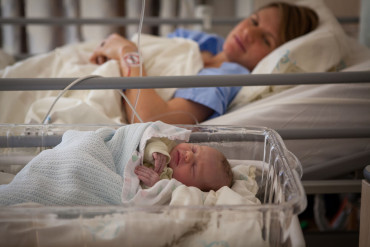Did My Baby Suffer from a Birth Injury Because of Insufficient Monitoring?

There are many different types of personal injury cases. With everything from medical malpractice to product liability, they all have the potential to result in catastrophic outcomes because of someone else’s negligence. But one of the most heartbreaking are birth injuries.
Whether it is a couple’s first or fourth child, bringing a new life into the world is nothing short of a miracle. For months, the couple will watch and wait in anticipation. Hearing the heartbeat for the first time and seeing the tiny baby through the ultrasound makes everything feel real. And then finally comes the day of the birth, which should be one of the most exciting and emotional times for individuals. Unfortunately, for many couples, the day can have an undesirable outcome when the team of medical professionals fail to provide the proper medical care.
How Often Do Birth Injuries Occur?
Statistics reveal that approximately six to eight out of every 1,000 infants born in the United States suffer a birth injury. This means that roughly 28,000 babies experience a birth injury each year. But the most devastating fact is that almost half of all birth injuries are avoidable when the necessary monitoring occurs. If the risk factors are identified and planned for early on, there is a reduced chance of a birth injury impacting the baby.
How Should a Pregnant Woman and Baby Be Monitored?
In an ideal world, the monitoring should begin as soon as a woman believes she is pregnant. Over the first several weeks and months, there will be bloodwork and ultrasounds that can ensure that everything is going well and the pregnancy is viable. As the pregnancy progresses, the visits to the OB/GYN will continue. Subsequent ultrasounds should be conducted to monitor other details, including:
- Anatomy ultrasound to identify any potential issues in the baby’s development
- Placement and proper functioning of the placenta and umbilical cord
- Size of the baby, especially in proportion to the mother’s birth canal
- Position of the baby – ideally, baby should be head down around 26-28 weeks
Both the baby and mother should be continuously monitored throughout the pregnancy and should continue once the mother goes into labor. In a typical hospital setting, the baby’s heartbeat and the mother’s contractions are monitored during labor to ensure that neither are in distress.
What Happens When There is Insufficient Monitoring?
Regular monitoring procedures are in place for a reason – to help ensure the safety of both mother and baby. When doctors, nurses, and other healthcare professionals provide negligent treatment and fail to monitor sufficiently, the results can be detrimental.
For example, let’s say that there was insufficient monitoring throughout the mother’s pregnancy. A routine ultrasound could have easily indicated that the baby was measuring large, while the mother’s birth canal was exceptionally small. Instead of knowing this information and preparing for a cesarean section to safely deliver the baby, the mother struggles to attempt to deliver the baby vaginally. If the baby goes into distress and is deprived of oxygen during the difficult labor, severe birth injuries could occur.
Insufficient monitoring can also occur during the actual labor and delivery process. If the nurses fail to check on the mother and baby routinely, it could go unnoticed for a while that the baby is in distress. If the cord has wrapped around the baby’s neck or the baby simply cannot handle the stress of labor, severe complications can transpire quickly.
What Should I Do If My Baby Suffered from a Birth Injury?
If you feel that your baby suffered from a severe birth injury because of someone else’s negligence, you have every right to pursue legal action against the doctor, healthcare professionals, or medical institution. Whether the doctor failed to review your ultrasounds during pregnancy, the nurses did not monitor the baby regularly during labor, or the hospital was unprepared, the common theme is that their negligence resulted in your baby being harmed.
The first step is to consult with an experienced birth injury attorney, and you want to work with a law firm that has a proven track record of winning personal injury cases for its clients. Your attorney will then guide you through every step of the process, from working with a medical expert to determine exactly what went wrong to handling all the paperwork for the lawsuit.
How Can Ross Feller Casey Help Me?
The attorneys at Ross Feller Casey have an unmatched record of results on behalf of their catastrophically injured clients. In fact, in just the past three years alone, the law firm has recovered well over $600 million in individual cases, including many that involved birth injuries. If you feel that your child suffered from a birth injury because of negligence in monitoring, contact the team at Ross Feller Casey for a free evaluation of your case.
Disclaimer: Ross Feller Casey, LLP provides legal advice only after an attorney-client relationship is formed. Our website is an introduction to the firm and does not create a relationship between our attorneys and clients. An attorney-client relationship is formed only after a written agreement is signed by the client and the firm. Because every case is unique, the description of awards and summary of cases successfully handled are not intended to imply or guarantee that same success in other cases. Ross Feller Casey, LLP represents catastrophically injured persons and their families in injury and wrongful death cases, providing legal representation in Pennsylvania and New Jersey.





